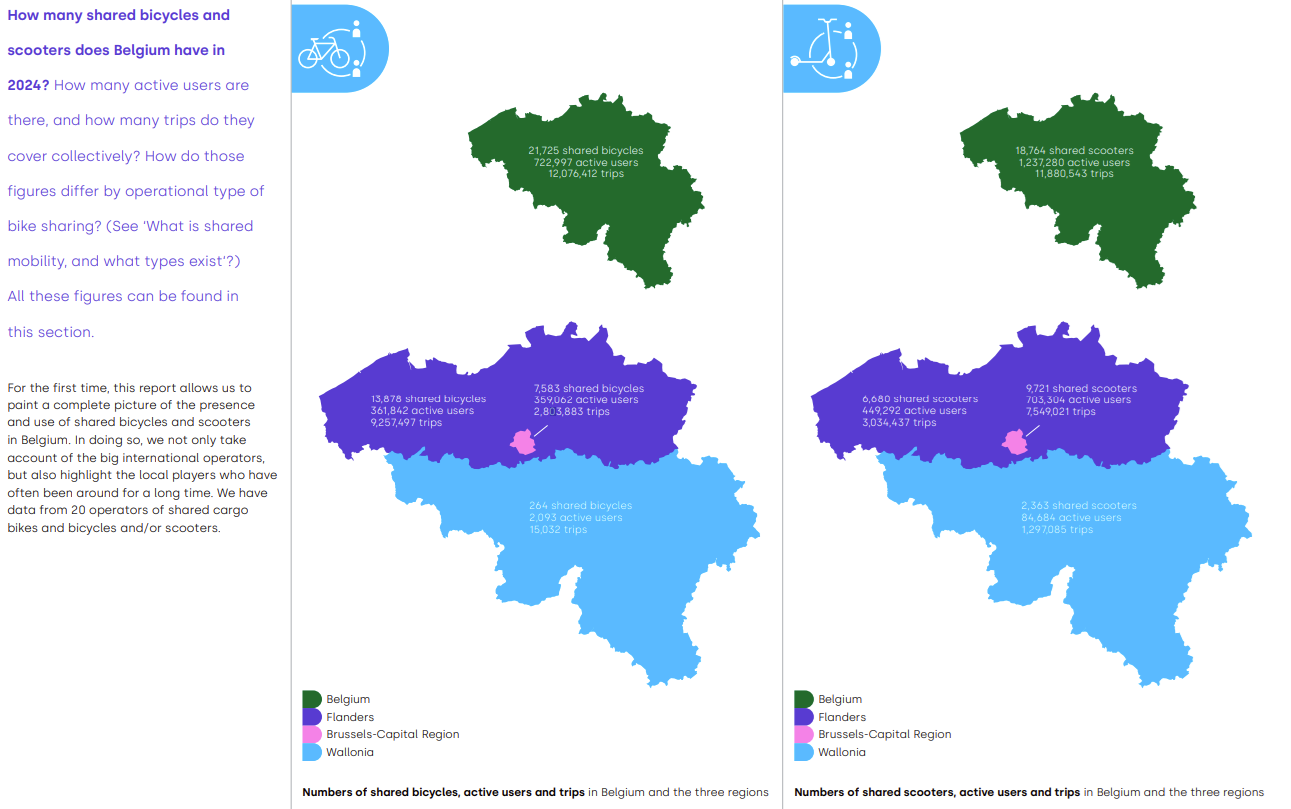Way To Go has recently published the 2024 Shared Mobility Report, which provides an in-depth analysis of Belgium’s shared mobility landscape.
Shared mobility in Belgium is on the rise, with new figures confirming wider adoption of shared bikes, scooters, and cars across the country. The 2024 Shared Mobility Report, published by Way To Go (formerly Autodelen.net) provides a deep dive into these trends, analyzing how shared mobility services are expanding, how they fit into broader transport networks, and what’s needed to support their continued growth. With nearly 50,000 shared vehicles in operation and 24 million trips made on shared bikes and scooters, shared mobility is becoming a crucial part of sustainable transport networks.
The report presents key trends in car sharing, bike sharing, and scooter sharing, highlighting how different regions are integrating these services and where further efforts can help improve accessibility, sustainability, and multimodal transport solutions.
The report confirms that shared mobility adoption remains strong in Flanders, where a 22% increase in car-sharing users signals a shift toward more flexible transport solutions. The region also accounts for 76.7% of all shared bike trips in Belgium, demonstrating the continued importance of cycling as a core mobility option. One of the ShareDiMobiHub pilots, Leuven, is actively expanding its network of shared mobility hubs, is leveraging these trends to enhance car-sharing and e-bike availability. The city has implemented various pilot projects that assess the efficiency of station-based and free-floating shared vehicles, gathering technical data to refine service delivery.

Source: Way To Go (2025).
How the report shapes future shared mobility growth
One of the key strengths of the 2024 Shared Mobility Report is its data-driven approach to understanding how and where shared mobility works best. The findings confirm what many cities, including Leuven, are already experiencing:
- The more available shared mobility is, the more people use it. Cities that increase the number of shared vehicles and improve accessibility see stronger adoption rates.
- Shared mobility works best when it’s integrated with public transport. If bikes, scooters, and shared cars are easy to combine with trains, buses, and trams, people are far more likely to choose them over private car ownership.
- Long-term success requires stability. Ensuring that shared mobility providers can operate sustainably—through good policy, clear regulations, and strong partnerships—is crucial to keeping these services available and reliable.
For ShareDiMobiHub, these insights are incredibly valuable in shaping the development of shared mobility hubs across European cities. The lessons from this report will help cities like Leuven and others in the project make informed choices about where to expand services, how to improve user experience, and how to create policies that ensure shared mobility remains a long-term solution rather than a temporary trend.
A future where shared mobility is the norm
The Way To Go report provides a solid foundation for understanding where shared mobility is heading and what’s needed to keep up the momentum. As part of ShareDiMobiHub, cities like Leuven, alongside partners like Way To Go, are working to translate these insights into practical actions—from scaling up shared mobility hubs to ensuring that these services fit seamlessly into broader urban mobility strategies.
With the right policies, investments, and public-private collaborations, shared mobility has the potential to become a standard part of transport networks, reducing congestion, improving air quality, and making cities more liveable for everyone. Reports like this one help ensure that the right steps are taken to make that vision a reality.
